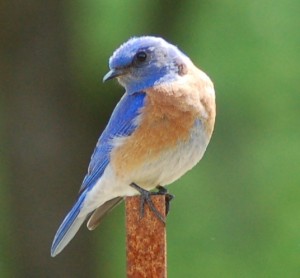Working successfully with nature at Spring Mountain Vineyard is an inspiration to all

One doesn’t need to drive far up Spring Mountain from Main Street Saint Helena before they reach a hidden property with beautiful formal gardens, majestic redwoods and bluebirds flying above. With its palatial Victorian home, Miravalle, one can imagine that the vast 845-acre estate looks very much like it did in the 19th century. Its earliest vineyards date back to 1873, while the Beringer Brothers planted their first vines there in 1882.
In such a natural setting adjacent to protected Napa Land Trust property, Spring Mountain Vineyard farms organically and sustainably. In fact, vineyard manager and longtime Saint Helena resident Ron Rosenbrand said that he was incentivized to work there when the owner told him in 2003, “I want to be organic.”
So in 2003, when Rosenbrand discovered that vine mealybugs had been introduced into one of its 135 vineyard blocks, he faced a dilemma, since the Napa County agricultural commissioner had issued an order saying that any vineyard infested with the pest must be treated with chemical insecticides. Mealybugs are a well-known vineyard pest around the world that can damage fruit and leaves and vector a plant virus which delays fruit ripening. Rosenbrand complied with the order for a couple of years but could see that it was just not working.
Having worked successfully in the past with predator bugs on spider mites, Rosenbrand appealed to the ag commissioner for special permission to use beneficial insects for biological control of mealybugs. With the commissioner’s blessing, Rosenbrand contacted UC Berkeley scientists, including Dr. Monica Cooper, now Napa County farm advisor for the University of California Cooperative Extension (UCCE). Cooper had been experimenting with bio-controls in other parts of the state, but their partnership with Spring Mountain Vineyards beginning in 2005 was among the first in Napa Valley.
When they first ceased application of the harsh Lorsban and Lannate chemicals, the bug population exploded. Rosenbrand said he was “sweating bullets” for a couple of months as the aggressive bio-controls were put into place but was committed to the project and had a supportive owner.
In July 2009 during a UCCE workshop at Spring Mountain Vineyard aimed at educating the farming community, Cooper reported great progress using a “multi-pronged” approach to combat mealybugs, including dissemination of predator beetles and parasitic wasps, setting of pheramone traps for flying males and applying the softer chemical Applaud — an insect growth regulator — early in the season.
Today, Rosenbrand reports that the mealybug problem is now “100% under control” with biological solutions and that they haven’t used Applaud for two vintages now.
Another major project with wide implications that Spring Mountain Vineyard has undertaken is their biological approach to controlling blue-green sharpshooters, a vector for deadly Pierce’s Disease. Working again with University of California, they posted about 750 bluebird houses on the property over the last three years, during which time they have seen a dramatic reduction in the sharpshooter population. They know there is a direct link, because they find remains of sharpshooters in the birds’ droppings. Bluebird expert Julia Jedlicka of UC Santa Cruz will be conducting experiments at Spring Mountain Vineyard this spring.
For their commitment to using alternatives to chemicals in the vineyards, Spring Mountain Vineyard received the 2010 Innovators Award given through the California EPA, one of only about 100 such awards given since 1994 to a broad spectrum of businesses.
Spring Mountain Vineyard has a long-term commitment to preserving the ecosystem and thereby the quality of their cabernet sauvignon wines. The grapes are all estate-grown on mostly eastern-facing hillsides that yield a low two tons per acre. Their 2006 Elivette Spring Mountain Cabernet Sauvignon ($125) is their signature wine which shows great finesse. It has a classic, restrained nose of black currant and cedarwood and on the palate, dense black fruit, full body, refined tannins and long finish.
Spring Mountain Vineyard gives tastings and tours by appointment only, beginning on the hour from 10:00 am to 4:00 pm. Please contact them through the website or by calling (877) 769-4637 or (707) 967-4188.
Learn how Spring Mountain Vineyard’s founder fought discrimination in the 19th century.
